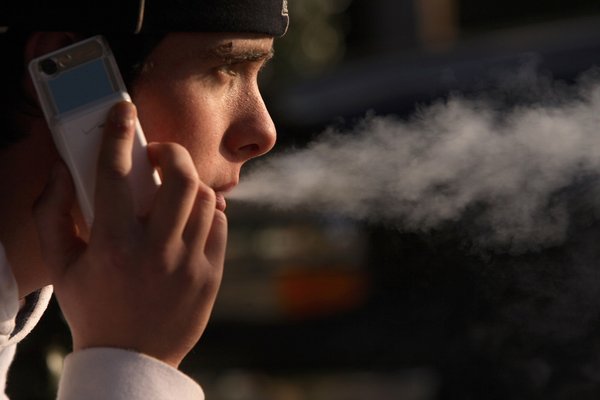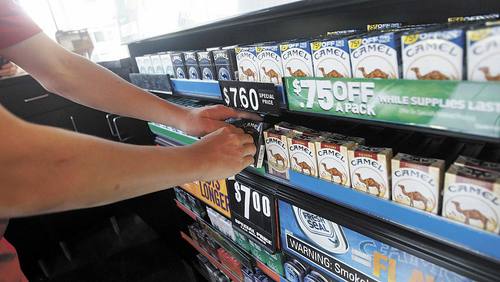Too many American teens are smoking 'little cigars,' report says
Melissa Dahl, NBC News
They look like cigarettes, and they’re just as harmful as cigarettes — but “little cigars” are much cheaper, and they come in flavors like chocolate or candy apple, which makes them very attractive to kids, experts say.
Now, for the first time, kids’ use of flavored little cigars has been tracked by U.S. researchers. About four in 10 smokers in middle school and high school say they use flavored little cigars, according to the new report, using data from the 2011 National Youth Tobacco Survey.
Tom Frieden, director of the U.S. Centers for Disease Control and Prevention, called the new data “disturbing.”
“Flavored little cigars are basically a deception,” Frieden says. “They’re marketed like cigarettes, they look like cigarettes, but they’re not taxed or regulated like cigarettes. And they’re increasing the number of kids who smoke.”
A little cigar looks almost exactly like a cigarette: It’s the same size and shape, but instead of being wrapped in white paper, it’s wrapped in brown paper that contains some tobacco leaf. Many little cigars have a filter, like a cigarette, according to the American Legacy Foundation, a nonprofit that seeks to prevent teen smoking.

“What makes a cigar a cigar is that it has some tobacco in the paper. Little cigars — there’s just enough tobacco in that paper to make them cigars,” says Erika Sward, assistant vice president for national advocacy at the American Lung Association. “They really are cigarettes in cigar clothing.”
Not that cigars are healthy. Little cigars – and large cigars and cigarillos (a longer, slimmer version of the classic large cigar) – contain the same harmful and addictive compounds as cigarettes. They can cause lung, oral, laryngeal and esophageal cancers and they increase the smoker’s risk of chronic obstructive pulmonary disease. The only upside of a cigar is the way they are usually smoked: Cigar smokers tend to take shallower puffs instead of deep inhales. But some research has shown people tend to smoke little cigars just like they’d smoke cigarettes, by inhaling deeply, which can exacerbate the tobacco’s health risks.

But because little cigars are technically not cigarettes, they are taxed far less than cigarettes, making them that much more appealing to teenagers, because “kids are especially price-sensitive,” Sward says. A pack of little cigars can cost less than half as much as a pack of cigarettes, experts say.
“We know if they were cigarettes, what they’re doing now would be banned,” Frieden says. “If they were cigarettes, there would be a much greater awareness of their harm. But because they’re seen as somehow different, they’re getting another generation of kids hooked on tobacco.”
Overall, tobacco use among American kids declined significantly from 2000 to 2011. The same is true for the smoking rate in U.S. adults, which dropped 33 percent in that decade. But the consumption of non-cigarette tobacco products — like cigars or loose tobacco — increased 123 percent in that same time period, Sward says.
Little cigar sales in particular have increased dramatically, more than tripling since 1997, says Danny McGoldrick, vice president of research for the Campaign for Tobacco-Free Kids. And most of those little cigars are flavored, thus making them more attractive to kids.
“They’re really cheap, and they’re really sweet, and they have an obvious appeal to kids,” says McGoldrick. “They’re not your grandfather’s cigar.”
Appealing flavors like chocolate, cherry, strawberry or candy apple make it easier for people — especially kids — to start smoking by masking the harshness of tobacco, anti-tobacco advocates say. It’s the same concept behind those “alcopops” – flavored, sweet alcoholic beverages like wine coolers that experts argue are especially tempting to underage drinkers. And adolescence is a crucial time to prevent smoking before it starts, because about 90 percent of smokers start by the time they turn 18, national statistics show.
In 2009, Congress gave the U.S. Food and Drug Administration immediate jurisdiction over cigarettes, smokeless and roll-your-own tobacco. Currently, Sward explains, the FDA has submitted a proposal that would allow it to regulate all tobacco products. She says this current study highlights the urgent need for the FDA to be able to regulate all tobacco products, including little cigars.
“They’re deadly – just like cigarettes,” Frieden says. “It’s really important that we use all means at our disposal to protect the next generation from getting hooked on tobacco.”
http://www.nbcnews.com/health/too-many-american-teens-are-smoking-little-cigars-report-says-8C11433058



